
Africa [credit: Mapswire.com]
Africa is a nascent innovation powerhouse, and its leadership will become increasingly obvious during the coming decades, but the seeds are already visible as this post reveals: Africa’s population is exploding, and its young people are adopting tech alternatives to countries’ long-insufficient health, education, and financial infrastructure.
If you’ve been interested in international development for long, you have seen many prognostications about “Africa rising” over the years only to see them fade into oblivion. Predicting profound economic shifts is like predicting earthquakes; you study the driving forces and your algorithms crunch the data.
That isn’t stopping Helga Stegmann. She has led “user experience” agency Mantaray since 2006, and she gave a riveting talk last week in Chicago hosted by partner agency BoldInsight. In my experience, user experience folks rarely have their hands on the pulse of disruptive economic change, but the reason she is an exception reflects that Africa’s economic transformation is happening at the grassroots level (as with most revolutions), and her key orientation is user experience design, so researching users across rapidly evolving interfaces in devices. Follow along with my notes of her remarks […]
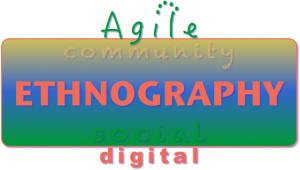 Agile Digital Ethnography uses an ethnographic research approach to analyze people’s online interactions. It creates a dynamic new market research capability that’s useful by itself and even more when used with surveys, focus groups, field work, and other primary research. Agile Digital Ethnography uses an ethnographic research approach to analyze people’s online interactions. It creates a dynamic new market research capability that’s useful by itself and even more when used with surveys, focus groups, field work, and other primary research.
I have learned that Agile Digital Ethnography provides a unique combination of research results. I have used it on client engagements since 2006. Like primary research, it reveals people’s behavior, thoughts, emotions, and motivations in rich detail; however, because it’s secondary research, it’s faster and less costly than most other methods. It’s very useful when it’s conducted before primary research since its results can inform the design of primary research instruments.
[…]
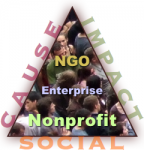
 How to Boost Employee Support for Nonprofit Fundraising reveals that, although employees can be tremendous supporters of nonprofit fundraisers, managers have to navigate some subtle waters to engage employees. How to Boost Employee Support for Nonprofit Fundraising reveals that, although employees can be tremendous supporters of nonprofit fundraisers, managers have to navigate some subtle waters to engage employees.
The key to “engagement” is making it voluntary and meaningful to employees as people. I say this because many organizations expect support, but expectation diminishes the voluntary requirement. When management harbors the attitude that employees owe them to promote the fundraiser, this will backfire. Here’s my response to a situation in the Nonprofit Technology Network forums.
A web/social media specialist for family services nonprofit sought advice for increasing employee participation in their annual fundraiser. Most of the responses explained how to use email signatures (someone even suggested appending promotional text to employees’ email signatures globally!). Someone else suggested gift certificates. I took a different tack.
[…]
 The Potential of Female Leadership explores what lessons we may learn from bonobos’ matriarchal social structure, so we can build stronger, more collaborative human communities and groups. Bonobo Handshake is an enthralling insightful book, which I review here. A tremendous bonus is its similarities to and significant differences from Chimpanzee Politics (reviewed yesterday). The Potential of Female Leadership explores what lessons we may learn from bonobos’ matriarchal social structure, so we can build stronger, more collaborative human communities and groups. Bonobo Handshake is an enthralling insightful book, which I review here. A tremendous bonus is its similarities to and significant differences from Chimpanzee Politics (reviewed yesterday).
Bonobo Handshake was on the same library shelf as Chimpanzee Politics, but it is a very different book, and in delightful ways. At the same time, it offers intriguing insight into bonobos’ behavior, which differs significantly from chimpanzees’ and holds interesting lessons for human societies and groups. Although Woods is not a primatologist per se, she has conducted extensive research with her husband, who is, so explaining scientific experiments forms a key part of this book.
Bonobo Handshake is rare in a surprising way. Deftly and subtly, it contrasts the joy, harmony and matriarchal structure of the bonobos with chimpanzees’ and humans’ patriarchal societies and violence: the wars in and around the two Congos result in the […]
 True love for customers reveals how nonprofit, commercial and government organizations of all sizes can create much stronger relationships and business by transforming how they relate to customers. True love for customers reveals how nonprofit, commercial and government organizations of all sizes can create much stronger relationships and business by transforming how they relate to customers.
Philosophers, clergy and psychologists have long acknowledged love as the most powerful force between humans. Love connects people like nothing else can, I think because love touches and binds together so many parts of the brain simultaneously: Love stimulates the reptilian brain because it’s related to survival. It is central to the limbic brain, which is grounded in emotion and memory. And love throughly engages the neocortex in art, ideals, and many other forms.
[…]
 In Healing Business, I’ll share why I think business needs healing and how CSRA is doing it with experiential social media. Business is wounded from a human point of view because it’s become very impersonal; large organizations don’t mean to, but they treat employees and customers as numbers because they don’t know or trust them. Experiential is a practical way to change that. In Healing Business, I’ll share why I think business needs healing and how CSRA is doing it with experiential social media. Business is wounded from a human point of view because it’s become very impersonal; large organizations don’t mean to, but they treat employees and customers as numbers because they don’t know or trust them. Experiential is a practical way to change that.
If you’d like to watch this post instead of reading it, click the thumbnail button!
[…]
 On human experience invites you to examine common marketing practices from a human experience perspective. It expands part of a presentation I gave at the University of Chicago Booth that the audience experienced as mind-bending based on their facial expressions. On human experience invites you to examine common marketing practices from a human experience perspective. It expands part of a presentation I gave at the University of Chicago Booth that the audience experienced as mind-bending based on their facial expressions.
Quite by accident I’ve happened on a rare view of humanity while practicing experiential social media during the last ten years. Experiential’s core research process involves conducting ethnographic research of thousands of people in specific situations. I analyze human behavior in communities in digital public, and it’s very rich, nuanced and complex. Ethnographic yields unparalleled qualitative and quantitative insights into behavior and human experience.
Experiential consistently reveals that many marketing practices repel people rather than attracting them because the environment in which marketing is practiced has completely changed from when these practices developed. Marketing creates mistrust and pushes people away, as I’ll show below. This post attempts to reveal this anachronism to you, so you can correct your practices and take the advantage from your competitors.
[…]
Social media strategy lessons learned summarizes eleven golden rules I’ve learned while leading strategy and its execution for global firms. Some of them might surprise you: I’ve come to learn that I have a different perspective on social media strategy since I advised global firms and startups in their corporate strategies before founding CSRA in 2006.
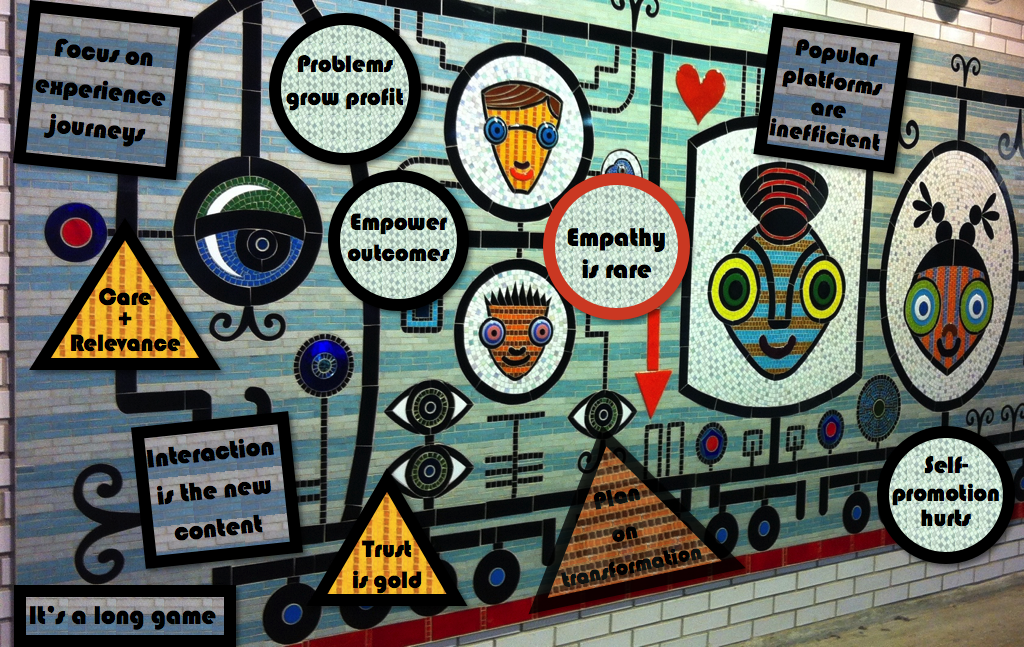
Before diving into lessons learned, let’s specify what we mean by social media strategy. “Strategy” itself is an overused work that denotes some mixture of research and planning. The strategy trade-off is simple: the more research and analysis you do upfront, the more risks you can foresee and account for in your plan. When you put your plan into action, you make fewer mistakes and execute more efficiently. Conversely, “minimum viable”/lean strategy does less research upfront, so the team learns while doing. Neither approach is universally “right,” and both work best for certain situations and firms.
[…]
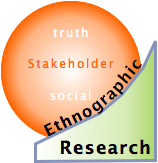 [Updated] Ethnographic research of social media is one of my biggest secrets. It has become the foundation of CSRA’s ability to create trust at scale, so here I’ll share how I came to use it with social media. Then I’ll explain what ethnographic research is, why it’s vital to CSRA, and how it works, so you can use it. Finally, I’ll share use cases for experiential social media, product management, business innovation, and cross-border business. [Updated] Ethnographic research of social media is one of my biggest secrets. It has become the foundation of CSRA’s ability to create trust at scale, so here I’ll share how I came to use it with social media. Then I’ll explain what ethnographic research is, why it’s vital to CSRA, and how it works, so you can use it. Finally, I’ll share use cases for experiential social media, product management, business innovation, and cross-border business.
[…]
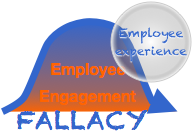 The Employee Engagement Fallacy reveals that most literature, papers, and methods are built on faulty Industrial Economy employment attitudes, and it provides an approach that uses experiential social media to help reframe employment and performance. The Employee Engagement Fallacy reveals that most literature, papers, and methods are built on faulty Industrial Economy employment attitudes, and it provides an approach that uses experiential social media to help reframe employment and performance.
Although the idea of “employee engagement” can be a rare opportunity to increase competitiveness, its practice is compromised by well intended but flawed logic.
Here’s the fallacy: Employee “engagement” is the result of employees’ experiences while they’re working at employers. Few engagement programs focus on employees’ experiences, so they fall short.
Engagement is not achieved by a program or initiative that focuses on the outcome. Employers see much more success at achieving the result when they focus on empowering the experiences their employees want when they decide to work at the employer. Experience is the motor of engagement, so empowering experience is the first step of raising productivity and lowering employment costs, two common employee engagement goals. Here’s how it’s done.
[…]
|
|


 Agile Digital Ethnography uses an ethnographic research approach to analyze people’s online interactions. It creates a dynamic new market research capability that’s useful by itself and even more when used with surveys, focus groups, field work, and other primary research.
Agile Digital Ethnography uses an ethnographic research approach to analyze people’s online interactions. It creates a dynamic new market research capability that’s useful by itself and even more when used with surveys, focus groups, field work, and other primary research.
 How to Boost Employee Support for Nonprofit Fundraising reveals that, although employees can be tremendous supporters of nonprofit fundraisers, managers have to navigate some subtle waters to engage employees.
How to Boost Employee Support for Nonprofit Fundraising reveals that, although employees can be tremendous supporters of nonprofit fundraisers, managers have to navigate some subtle waters to engage employees.  The Potential of Female Leadership explores what lessons we may learn from bonobos’ matriarchal social structure, so we can build stronger, more collaborative human communities and groups. Bonobo Handshake is an enthralling insightful book, which I review here. A tremendous bonus is its similarities to and significant differences from Chimpanzee Politics (reviewed yesterday).
The Potential of Female Leadership explores what lessons we may learn from bonobos’ matriarchal social structure, so we can build stronger, more collaborative human communities and groups. Bonobo Handshake is an enthralling insightful book, which I review here. A tremendous bonus is its similarities to and significant differences from Chimpanzee Politics (reviewed yesterday). True love for customers reveals how nonprofit, commercial and government organizations of all sizes can create much stronger relationships and business by transforming how they relate to customers.
True love for customers reveals how nonprofit, commercial and government organizations of all sizes can create much stronger relationships and business by transforming how they relate to customers. In Healing Business, I’ll share why I think business needs healing and how CSRA is doing it with experiential social media. Business is wounded from a human point of view because it’s become very impersonal; large organizations don’t mean to, but they treat employees and customers as numbers because they don’t know or trust them. Experiential is a practical way to change that.
In Healing Business, I’ll share why I think business needs healing and how CSRA is doing it with experiential social media. Business is wounded from a human point of view because it’s become very impersonal; large organizations don’t mean to, but they treat employees and customers as numbers because they don’t know or trust them. Experiential is a practical way to change that. On human experience invites you to examine common marketing practices from a human experience perspective. It expands part of a presentation I gave at the University of Chicago Booth that the audience experienced as mind-bending based on their facial expressions.
On human experience invites you to examine common marketing practices from a human experience perspective. It expands part of a presentation I gave at the University of Chicago Booth that the audience experienced as mind-bending based on their facial expressions.
 [Updated] Ethnographic research of social media is one of my biggest secrets. It has become the foundation of CSRA’s ability to create trust at scale, so here I’ll share how I came to use it with social media. Then I’ll explain what ethnographic research is, why it’s vital to CSRA, and how it works, so you can use it. Finally, I’ll share use cases for experiential social media, product management, business innovation, and cross-border business.
[Updated] Ethnographic research of social media is one of my biggest secrets. It has become the foundation of CSRA’s ability to create trust at scale, so here I’ll share how I came to use it with social media. Then I’ll explain what ethnographic research is, why it’s vital to CSRA, and how it works, so you can use it. Finally, I’ll share use cases for experiential social media, product management, business innovation, and cross-border business.